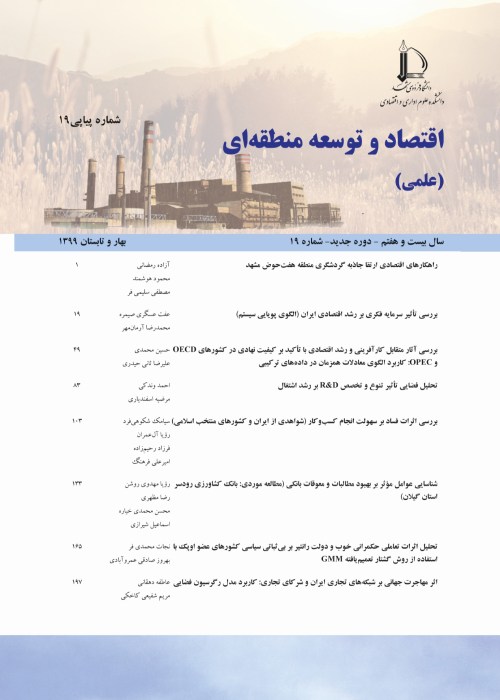Investigating the effect of Economic Development, Education and Gender Equality on Democracy index Among the OPEC countries
Democracy is one types of sovereignty, and its specific aspect is the formal declaration of the principle of the affiliation of a minority with the majority and the recognition of the freedom and the equal rights of individuals and citizens (Alem, 1996: 293). Since Pericles defined it as "the sovereignty of the people", until today that its consolidation and development in various western schools of thoughts, especially in the United States, is considered as the basic and specialized duty of the government, democracy has gone through major changes. As a result, it could not be studied separately from the economic and social conditions, and the actual and practical situation of society should be taken into consideration. In the final analysis, any democratic structure or system, as a form of political organization of community, serves as a certain mode of production and is determined by it. The theme and form of democracy have been evolved throughout history and has, always and completely, been closely dependent on the related socio-economic formations.In general, democracy is a form of governing that its power source is people, in which the choices of rulers are with the people and government affairs directly or indirectly governed by the people themselves. Economic development and political structure are closely interconnected. The success and duration of every political structure, whether totalitarian or democratic, depends on economic development, economic efficiency, and the quality of the government's economic policies. Real democracy could not be achieved without the equal participation of women in all institutions as well as proper access to education.
This study seeks to examine the impact of economic development, education, and gender equality on democracy among a selection of OPEC countries, including Iran, Saudi Arabia, Kuwait, Venezuela, Qatar, United Arab Emirates, and Algeria, in over 2006-2016 using the generalized method of moments (GMM).The Democracy Index of the Economist Information Unit (EIU), annually shows a general picture of the state of democracy in the world; this index is based on 60 indicators grouped in five different categories measuring election method, pluralism, civil liberties political participation, and political culture. This index covers a range of 1-10 and categorizes countries as one of the four regime types: full democracies (8-10), flawed democracies (6-7/9), hybrid regimes (4-5/9), and authoritarian regimes (less than 4).The Human Development Index (HDI) measures the average achievements in a country in three basic dimensions: health, education, and income. The indicators of these three dimensions are calibrated and combined to generate an HDI score between zero and one.In addition, the percentage of enrollment in primary School (SC) is used as a measure of education. Gender equality is calculated by the percentage of women labor force (LA), the political participation of women in the National Parliament (SE), and the Gender Development Index (GDI).
According to the model estimation results, from the indices measuring economic development, namely GDP per capita and energy use, the former has a negative relationship with democracy while the latter has a positive link with democracy. Negative and meaningfulness of GDP per capita indicate that there is an inverse relationship between oil revenues and the level of democracy and political freedoms in oil-rich countries, as demonstrated by researchers like Friedman (2006) and Wacziarg (2011). In other words, based on these studies and the results of present study, it can be stated that by increasing oil revenues, the level of democracy in oil-rich countries has been reduced. As a result, there is a negative impact on the quality of people’s lives and their social welfare.The positive sign of energy use per capita, as an indicator of consumerism as well as a criterion for increasing economic growth, reflects the fact that people in oil-rich countries, who have a strong tendency to taking advantage of the modern features of the civilized world and are obsessed with new (and probably high-consumption) goods, may welcome democracy as a new commodity. Education also has the task of preparing students for the citizenship of the international community. The more foundation of democracy is been valued at the elementary education, the more the child will be prepared to accept a democratic society. Consequently, the government have to move in the same direction and respond to a generation that has been taught with the principles of democracy from their childhood.There is also a positive relationship between democracy and women's political participation. On the one hand, the real democracy is not realized without full and equal participation of women in all institutions. On the other hand, women’s equal rights in public and political life will fully be recognized just in the presence of democracy.What is evident in the current study is that all of the studied countries have been able to achieve the indicators to some extent by reaching an acceptable level of human and economic development over the studied years. Existence of a positive relationship between some of the above-mentioned factors suggests that the aforementioned countries should create necessary conditions and fundamental institutions to materialize democracy-related goals and public participation, and reduce their focus on oil revenues as much as possible.
- حق عضویت دریافتی صرف حمایت از نشریات عضو و نگهداری، تکمیل و توسعه مگیران میشود.
- پرداخت حق اشتراک و دانلود مقالات اجازه بازنشر آن در سایر رسانههای چاپی و دیجیتال را به کاربر نمیدهد.


